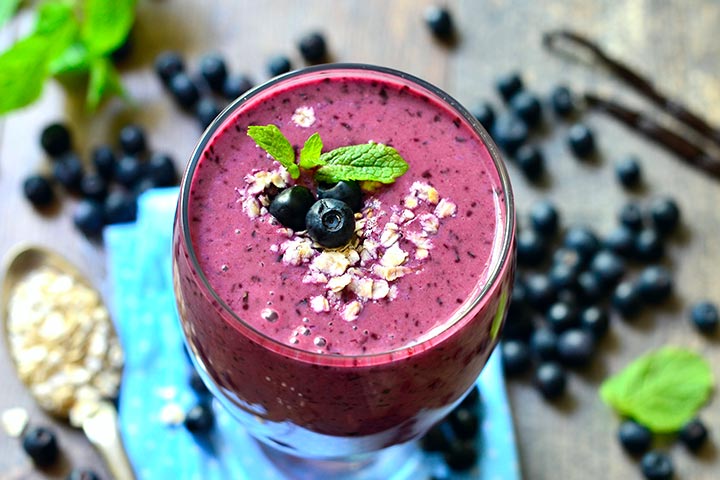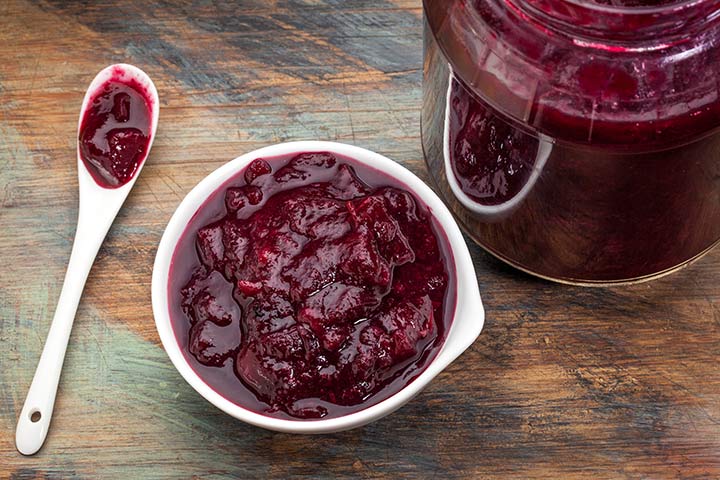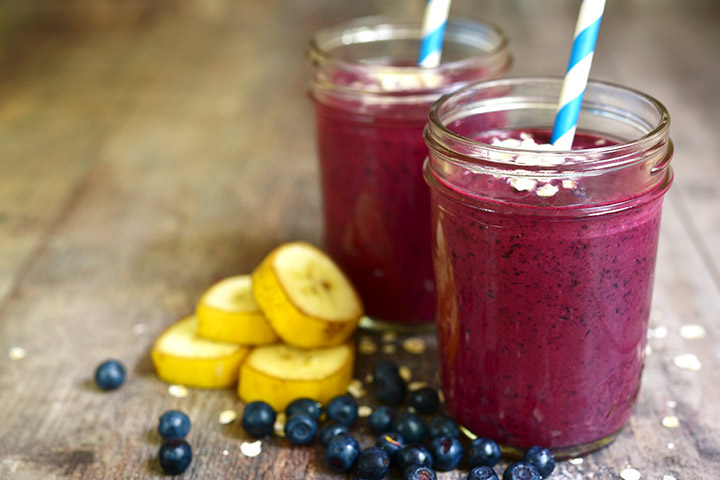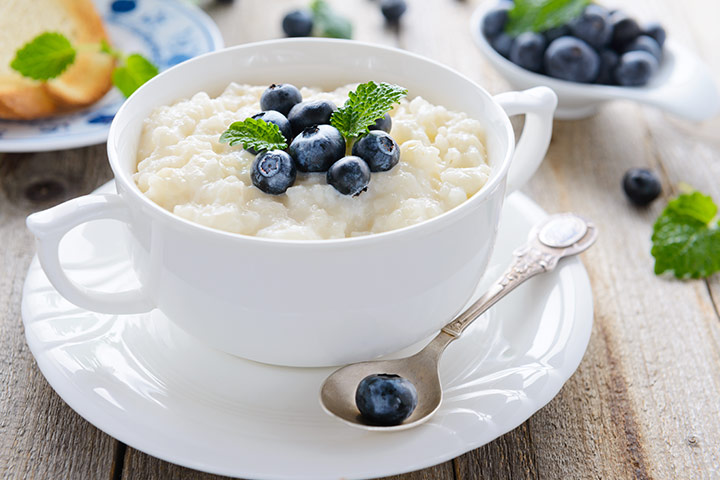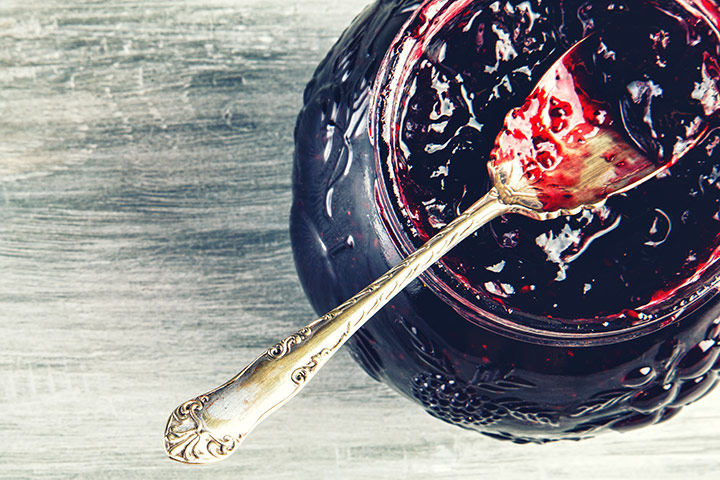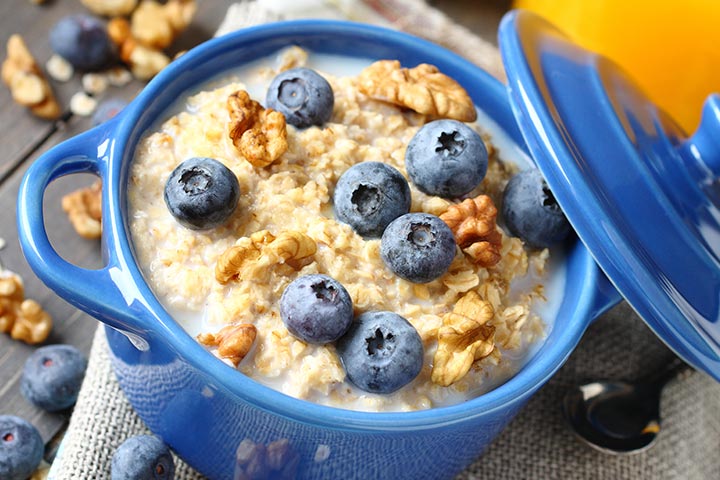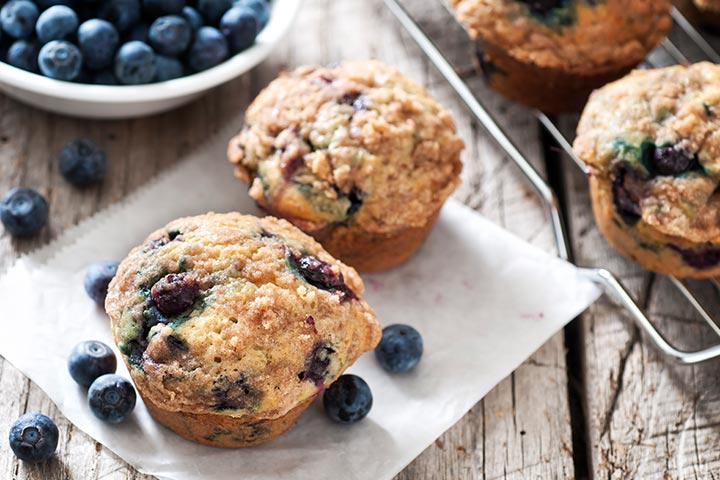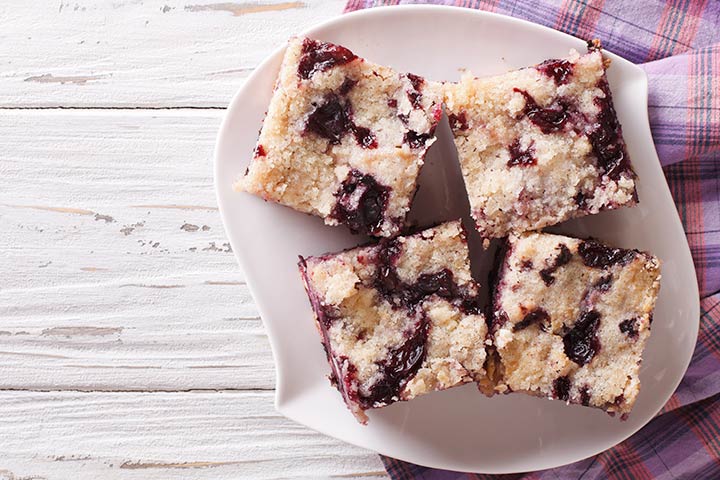Blueberries for babies can be an ideal solid food choice to start weaning. Packed with lots of nutrition, blueberries make for a delicious treat for your little ones. After strawberries, blueberries are the next popular choice of berries that are a good source of fiber and vitamins.
So if you are thinking of introducing blueberries to your baby, read on to learn more about their nutritional benefits. We have also shared some tasty blueberry recipes that your infant may enjoy.
Blueberries – The Superfood
The blueberries are a significant source of micronutrients such as magnesium, zinc and vitamins A, E, K, and B-complex.
The plant is grown in the soil with an acidic pH, which also reflects in the fruit that contains high amounts of ascorbic acid or vitamin C.
The fruit is also rich in nutrients like calcium, phosphorus, and potassium, making it a complete package thus referred as a ‘Superfood’.
Are Blueberries Good For Babies?
Yes, they are good for babies.
There is a common thumb rule adopted by most moms, which is ‘no berries till 12 months’. That is true for strawberry, raspberry, and blackberry that belong to the rose family. These contain allergens that can cause eczema and upset digestion in babies.
But blueberry belongs to a different cohort in the plant kingdom that is unrelated to strawberries and thus is safe to feed. In fact, natural blueberry flavoring is found in several baby foods, which is indicative of the fact they are suitable for infants.
In case your baby is prone to allergies in general then be watchful for any symptoms of blueberry allergy, and consult your pediatrician before introducing the fruit to the diet.
When Can Babies Eat Blueberries?
Babies can eat blueberries from the eighth month. However, if your baby develops a taste for solid food by the sixth month, you may consider introducing blueberries earlier. In that case, you have to be extra careful in checking for any symptoms of potential allergy. For younger babies, feed blueberries as puree and for older ones of nine months and above you can try some finger-foods.
Nutritional Value And Health Benefits Of Blueberry For Babies
Key Nutrients In Blueberry
Nutrients per 100gm of Blueberry (1):
- Carbohydrate 14.49 gm
- Fiber 2.4 gm
- Protein 0.74 gm
- Natural Sugars 9.96 gm
- Minerals
- Potassium 77 mg
- Phosphorus 12 mg
- Calcium 6 mg
- Magnesium 6 mg
- Vitamins
- Vitamin E 0.57 mg
- Vitamin C 9.7 mg
- Vitamin B3 0.418 mg
- Vitamin K 19.3 µg
A mere 50gm of blueberry in the form of snacks can give 3mg of calcium and 3mg of magnesium, which is great for the development of your baby’s bones. Here are some more health benefits of blueberry:
1. Keeps blood pressure under control:
A bowl of 100g of blueberries contains as much as 77mg of potassium, a micronutrient essential for maintaining ideal blood pressure even in babies. According to a meta-analysis conducted by several researchers from multiple institutions, a high intake of fruits, including blueberries, showed a 19% reduction in the risk of developing hypertension.
2. Regulates blood circulation:
Experiments have shown that blueberries can help prevent the buildup of plaque in the arteries by reduction of cholesterol (2). Babies have a developing circulatory system and thus the inclusion of blueberries in their diet can aid in healthy blood vessel development.
3. Supports bone growth:
Vitamin K in the fruit helps in the synthesis of osteocalcin, a bone protein, which helps in keeping bones strong and healthy. The presence of vitamin K along with calcium and magnesium makes blueberries a great fruit for bones.
4. Good for a healthy heart:
Blueberries are rich in polyphenols and fiber that are clinically proven to boost cardiovascular health (3). It thus provides a healthy heart or cardioprotective nutrients for your baby.
5. Cognitive development:
Thanks to the mix of various beneficial nutrients and antioxidants, blueberries help in keeping the nervous system healthy. They slow the weakening of mental capacity, support brain health, and help in general cognitive well-being (4).
6. Antioxidants control free radicals:
According to the USDA Human Nutrition Center (HNRCA), blueberries have the richest antioxidant concentration in the world of fruits and vegetables. These antioxidants help control free radicals that can cause aging-related issues.
7. Helps fight cancer:
Antioxidants also play a crucial role in supporting the immune system and preventing the buildup of malignant cells, which in turn may lead to cancer.
8. Relief from eye fatigue:
A study in Japan has found that the fruit eases eye fatigue. Also, the anthocyanin in the blue pigment of the fruit improves eyesight.
After knowing the nutritional values and health benefits of blueberries, you wouldn’t want to waste any time in feeding them to your baby.
However, do not introduce more than one new food at a time as it will be difficult to deal with allergies, if any.
Blueberry Allergy In Babies
Unlike other berries, blueberries are not allergens but may elicit an allergic reaction in the baby if introduced earlier than the sixth month.
Blueberry allergy can result in swollen eyelids and lips. The baby may also have itchy, swollen rashes and in some cases an upset stomach.
You may consider holding back the fruit if your baby:
- Just suffered a bout of eczema
- Has a history of chronic allergic reactions to new food
- Has a sensitive digestive system
- Has been clinically diagnosed with food allergy
You should not see any adverse reaction if you introduce blueberry with finger foods after the tenth month.
Also, parents often fear that blueberries would lead to constipation.
According to a mother of three, her weaning daughter did have an episode of constipation after she fed her blueberries in her weaning period. She says, “All was going well for the first three days when we introduced blueberries but on day three she started crying and shaking and seemed to have a lot of pain in her belly. She seemed to be constipated and straining to poop. I didn’t think it was the blueberries at first because why would raw fruit cause constipation? So I kept feeding it to her that day, and she kept on crying and showing signs of discomfort. When she finally was able to poop it was bright blue and really hard and this made me realize that the blueberries definitely weren’t working out for her. I stopped feeding them to her immediately … And within a day she was back to normal, no more crying, no more shaking and no more scary blue poop (i).”
How To Choose And Store Blueberries For Babies?
Select: Blueberries are susceptible to pesticide contamination that can be harmful to your baby’s health. So, purchase the fruit from a trustworthy source, preferably the one that stocks organic produce. Choose the berries that have a deeper blue color and are firm but not hard to touch. Do not buy the fruits that are dull and watery. Also, they should be able to roll freely; if they do not, then they are not fresh.
Store: Store the fruits in a freezer after sealing them in an airtight container. That way you will be able to store them for over two weeks without losing the freshness or flavor of the fruit. If you plan to consume them within a few days, then you can simply put the berries in a bowl, and cover it with cling film. The indigo-coloured pigment in the fruit’s skin acts as a natural preservative.
Wash the berries thoroughly before processing them.
Blueberry Baby Food Recipes
With your apprehensions gone, you are all set to introduce Blueberry to the diet of your little one. But how do you do it? Would you mash, coarse, or just stew it to a puree? Here are some amazing homemade blueberry baby food recipes, which not only have a delicious taste but also an amazing texture that your little one will love. These recipes are wholesome and healthy and can be easily prepared to provide a balanced and nutritious diet for your baby.
1. Blueberry puree:
You will need:
1 cup of fresh or frozen Blueberries
½ cup water
How to:
- Bring the water to a boil in a cooking pot. Add the blueberries intact and simmer for 15 minutes.
- Once the blueberry reaches a softer consistency, use a meshed or slotted ladle to strain the water and remove the fruits.
- Transfer the berries to a mixer/blender. Add the boiled water as required for a thinner consistency.
- Blend the entire mixture into a homogenous consistency ensuring there are no fat lumps or pieces of fruit skin that may gag your baby.
Let the mixture cool down and feed it to your baby one spoon at a time.
2. Apple blueberry sauce:
Your baby may not like the tartness in the taste of a blueberry. You may choose to add apples to them.
You will need:
- 1 cup fresh or frozen blueberries
- 2 medium-sized apples
How to:
- Peel, cut and dice the apples.
- In a cooking pot, add the diced apples and blueberries with one cup of water.
- Bring the mixture to a boil and then simmer for 15 minutes until it turns soft.
- Mash the mixture till there are no hard lumps. You can also puree it for a thinner consistency.
3. Banana blueberry puree:
Babies naturally love the sweet taste and a banana is a great fruit to tend to their sweet buds. You can combine the goodness of blueberry with the sweet taste of banana to make blueberry banana puree.
You will need:
- 1 cup fresh or frozen blueberries
- 1 medium-sized apples
How to:
- Peel the banana and cut it into small slices before mashing into a coarse paste.
- Boil a cup of water in a cooking pot. Add the blueberries along with the mashed banana and simmer the mixture for 15 minutes.
- Transfer the contents to a mixer/blender. If needed, use freshly boiled water to dilute the consistency.
- Let the mixture cool before you feed it to your little one.
4. Blueberry Peach Rice Mush
You will need:
- 1 small fully ripe peach
- 1/2 cup fresh blueberries
- 1 cup Brown rice
How to:
- Grind the brown rice into a fine powder. You can use over-the-shelf brown rice flour as well. Just make sure it has no added sugar, salt or preservatives.
- In a separate mixer, mix the peach and blueberries together and make a puree.
- Thoroughly mix the brown rice powder and fruit puree together. You can use boiled and cooled water for dilution or use blueberry puree, made separately, for the purpose.
In case your baby is 12 months or older it is safe to leave tiny lumps of rice and puree in the mix. Otherwise you can continue diluting with water until you get the desired consistency.
5. Blueberry Tofu Mash:
Tofu is made from coagulated soya milk, and is an excellent source of protein for weaning babies. It is suited for babies that are 11 months and older. Tofu is a non-allergen per se but you can check for any allergies while introducing small quantities in your baby’s diet.
You will need:
- 1/2 cup Blueberry Puree
- 1/2 packet of Firm Tofu
How to:
- Mix all the ingredients. Add water to soften the mixture if required.
- Transfer the ingredients to a mixer/blender and process it till it turns into a puree form. You can leave some solid lumps if your baby is used to eating solid finger foods.
6. Blueberry Puree Oatmeal Mix
It is a simple and easy-to-eat recipe that is quick to make and requires minimal processing. Just keep in mind that the oatmeal you purchase is plain and does not have any added flavors, salt, sugar or preservatives.
You will need:
- 1/2 cup blueberry puree
- 1/2 cup of plain unflavoured oatmeal
How to:
- Grind the oatmeal to a coarse powder – enough to form tiny lumps.
- Mix with the blueberry puree and feed. If you want to make it thin, use boiled and cooled water.
7. Blueberry Muffin:
Blueberry muffins can work great for your little one above 11 months of age.
You will need:
- 1 cup fresh blueberries
- 3/4 cup all-purpose flour
- 1/2 cup apple sauce
- 1tsp baking powder
- 1tsp cinnamon
- just under 1/4 cup vegetable oil
- 1 egg
- 1/4 cup milk
How to:
- Preheat the oven to 400 F (200 C). Grease the muffin cups with vegetable oil to prevent the muffin from sticking to the molds.
- Pour all ingredients, except the blueberries, in a mixing bowl and stir the mixture till it has a homogenous consistency.
- Add the blueberries. Stir the mixture gently to prevent the blueberries from breaking.
- Pour this batter into the muffin mold and bake for 25 minutes.
You can crumble the muffins into smaller pieces and mix it with apple sauce or blueberry puree for your baby. If your baby is older than 14 months, then you can break the muffin into smaller pieces and give it to him as finger food.
8. Blueberry Buckle:
The process of making blueberry buckle baby food is quite similar to the blueberry muffin. The ingredients are identical as well. The only difference is that here you pour the batter into a baking pan than in molds.
You will need:
- 2 cups fresh blueberries
- 3/4 cup white sugar
- 1/4 cup softened unsalted butter
- 1 egg
- 1/2 cup milk
- 2 cups all-purpose flour
- 2 ½ tsp baking powder
- 1 tsp salt
How to:
- Preheat the oven to 375oF (190oC). In the meantime grease the baking pan with some unsalted butter.
- Add butter, sugar and egg to a mixing bowl and stir well. Then pour the rest of the ingredients, except blueberry, and mix well.
- Add the blueberries and mix thoroughly. Pour the batter into the baking pan being careful that there are no air pockets left in between.
- Bake for 28-30 minutes.
You can serve this blueberry baby food by combining it with blueberry puree or apple sauce.
Blueberries for babies are a rich source of antioxidants and natural sugars. Along with helping regulate your baby’s blood pressure, these berries can also help in the cognitive development of babies and make their bones strong. You can start including blueberries in your baby’s diet when they begin to have solid food. However, if your baby shows signs of allergy or discomfort after consuming the blueberries, refrain from giving them any more and consult a doctor to diagnose the condition properly.
Key Pointers
- Blueberries are a superfood because of their nutrient-rich content, including vitamins, minerals, and antioxidants.
- Introduce blueberries to babies between 6-8 months old as a soft and easy-to-digest puree.
- Blueberries support blood pressure, circulation, bone growth, heart health, cognitive development, and may fight cancer and relieve eye fatigue.
- Avoid introducing blueberries to babies before six months old to prevent potential allergic reactions.
Craft a delectable and nutritious blueberry purée for your 6-9-month-old baby without the need for cooking.

